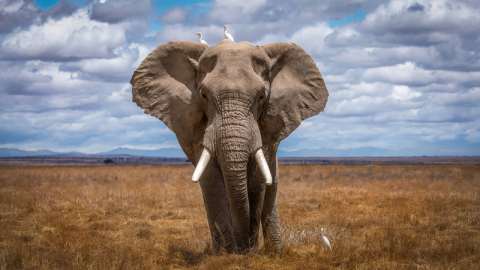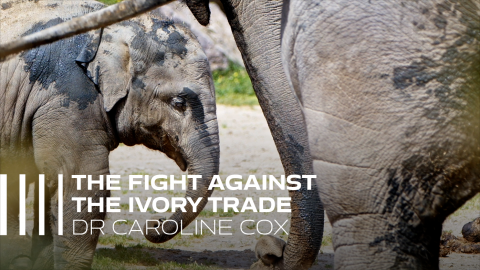

Research carried out by Caroline Cox has shaped guidance around ivory sale laws and helped to develop tools used to identify illegal ivory trade.
The Challenge
An estimated 100 African elephants are killed each day by poachers seeking ivory. Ivory is allowed to be sold in the UK as long as the elephant died prior to 1947. The seller of ivory holds the responsibility of identifying where a piece of ivory originates from, an almost impossible task. As long as newer ivory can pass for older pieces, there is still a market for more recently poached materials, and elephant populations will continue to reduce as poachers provide for this market.
What did we do?
After publishing a paper on ivory certification and trade, Caroline Cox responded to a UK Government consultation. She recommended the introduction of an ‘ivory passport’ which would accompany an item forever, providing details of the item’s origin. Cox then collaborated with a Cosmology PhD student to develop a machine learning algorithm to identify ivory being sold online as a material other than ivory which can be sold legally.
The Impact
New ivory will no longer be sold in the legal market within the UK. AI assisted identification of mislabelled ivory being sold online supports efforts to prosecute those illegally trading. This in turn will reduce the demand for new ivory, limiting demand for poached materials and so supporting African elephant populations.
The fight against the ivory trade

I've always loved wildlife.
0:07
Always.
0:08
And in 2005, my husband and I went to Southern Africa and had five days on safari in the Kruger.
0:18
It was wonderful.
0:20
We were out one day with our Ranger and the Ranger says, "Everybody stay very quiet." I was like, "Oh my goodness, what's going to happen next?" And almost imperceivably at first, you could feel the ground start to shake.
0:38
And over the hill came a herd of 26 elephants.
0:43
It was absolutely astounding and I don't think I've ever been so moved by a sight in all my life.
0:55
Wild elephant numbers have dropped by 62% over the last decade, and an estimated 100 African elephants are killed each day by poachers seeking ivory.
1:06
I was having dinner with my husband, Alister.
1:12
Alister is an antiques expert, he's an antiques valuer, and he was telling me about ivory that was coming to him that he felt was illegal to sell.
1:22
Ivory in the UK can be sold provided it came from an elephant that died before 1947.
1:31
And the question is, of course, how do you know when the elephant died?
1:35
The burden was on the seller to certify that the item they were selling was legal to sell and from looking at it, tell you whether it was pre or post 1947, and that is almost impossible to do.
1:49
That really started me thinking about how the law could be changed to protect elephants from poaching, because poaching in the southern African states is a massive problem still now.
2:04
My research, of course, started some time before the Ivory Act came into force and actually started to get some momentum.
2:11
On 6 October 2017, six months after Dr Caroline Cox's "Ivory Report" was published, the British Government launched a consultation into the sale of ivory in the UK.
2:23
In 2018, it was kind of like a light bulb moment for the Conservative government and they decided they were going to consult on the continuing trade in ivory in the UK.
2:36
I responded to the consultation process on behalf of the Ivory Project and I'm really pleased to say they listened to some of it, which was amazing.
2:45
There is now a type of ivory passport, which is what I'd recommended, to enable it to be sold, and that certificate stays with the item forever.
2:56
It means that we are going to see an end to at least in the real world, sale of ivory unless it's got a certificate anymore.
3:11
Do I think it will end poaching?
3:14
No.
3:15
My fear is that ivory will stop being sold in auction rooms and it will stop being sold in antique shops and it will go online where the regulation is just not so tight.
3:29
I could go onto eBay right now and show you hundreds, literally hundreds of pieces of ivory being sold.
3:37
But it's not being sold being called ivory.
3:39
It will be ox bone, it will be bovine bone.
3:43
I realised very quickly that actually things were changing online and it wasn't so much about the buzz word as the photography.
3:53
So how was I going to manage to look through thousands of photos of bone and ivory and one by one try and pick which is which?
4:03
It's almost impossible.
4:04
I really needed some help to do that.
4:07
And at that point we met Simone.
4:10
Simone is in his final year of his Ph.D.
4:15
He's a cosmologist, but he knows an awful lot about machine learning.
4:21
Machine learning is a subfield of artificial intelligence in which the algorithm or the model tries to learn from the data.
4:30
The computer vision algorithm has exactly the same approach that is used in self-driving cars, in which the goal is then to differentiate between people, between trees, between traffic lights.
4:45
And we are trying to do the basically the same thing, but in a more, much more specific way, we are just trying to distinguish bones from ivory objects.
4:54
These are two example of the things that we are trying to distinguish.
4:57
So this is an ivory object while this is made of bones.
5:01
You will be able to tell the difference if you get very close, because in this object there are present the Schrager lies in the very bottom while here there are the signature of the blood vessels that are inside the bones, that are this black spot that you can see.
5:19
They look very similar so it's going to be very hard to distinguish them.
5:23
We have already proved that with some machine learning approach we would be able to distinguish with a certain level of accurracy between the two.
5:30
And this can be incredibly useful, for example, for a police officer because that will discriminate automatically which of the images that they are finding online we will need to prosecute.
5:42
With something very simple we can achieve very big results.
5:47
The Ivory Project has played a small but significant role in ending the sale of ivory in the United Kingdom.
5:56
And that's an amazing thing to be able to say.
5:59
I know that we haven't solved the problem worldwide.
6:04
I know there are still poachers out there, but I've stopped the trade in the UK and that makes me feel good.
6:12
I think our next steps are going to be developing Simone's machine learning tool, his algorithm, to really perfect this.
6:20
If we can get the machine learning point to where we're able to go to somebody like eBay and say, "This is the tool you guys need" and if they could take this on board, we could stop the trade in illegal ivory at an instant online.
6:37
That would be incredible.
6:41
There's something about elephants, isn't there?
6:43
We have hunted them, we've used their ivory for millennia.
6:47
So for me, they embody the ability to keep going in the face of adversity.
6:55
It's extraordinary.
6:56
And I just find there's something incredible about that.
6:59
They're moving!
